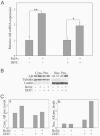The nuclear factor-kappaB pathway controls the progression of prostate cancer to androgen-independent growth
- PMID: 18701501
- PMCID: PMC2840631
- DOI: 10.1158/0008-5472.CAN-08-0107
The nuclear factor-kappaB pathway controls the progression of prostate cancer to androgen-independent growth
Abstract
Typically, the initial response of a prostate cancer patient to androgen ablation therapy is regression of the disease. However, the tumor will progress to an "androgen-independent" stage that results in renewed growth and spread of the cancer. Both nuclear factor-kappaB (NF-kappaB) expression and neuroendocrine differentiation predict poor prognosis, but their precise contribution to prostate cancer progression is unknown. This report shows that secretory proteins from neuroendocrine cells will activate the NF-kappaB pathway in LNCaP cells, resulting in increased levels of active androgen receptor (AR). By blocking NF-kappaB signaling in vitro, AR activation is inhibited. In addition, the continuous activation of NF-kappaB signaling in vivo by the absence of the IkappaBalpha inhibitor prevents regression of the prostate after castration by sustaining high levels of nuclear AR and maintaining differentiated function and continued proliferation of the epithelium. Furthermore, the NF-kappaB pathway was activated in the ARR(2)PB-myc-PAI (Hi-myc) mouse prostate by cross-breeding into a IkappaBalpha(+/-) haploid insufficient line. After castration, the mouse prostate cancer continued to proliferate. These results indicate that activation of NF-kappaB is sufficient to maintain androgen-independent growth of prostate and prostate cancer by regulating AR action. Thus, the NF-kappaB pathway may be a potential target for therapy against androgen-independent prostate cancer.
Figures





References
-
- Gregory CW, He B, Johnson RT, et al. A mechanism for androgen receptor-mediated prostate cancer recurrence after androgen deprivation therapy. Cancer Res. 2001;61:4315–4319. - PubMed
-
- Agoulnik IU, Weigel NL. Androgen receptor action in hormone-dependent and recurrent prostate cancer. J Cell Biochem. 2006;99:362–372. - PubMed
-
- Linja MJ, Savinainen KJ, Saramaki OR, Tammela TL, Vessella RL, Visakorpi T. Amplification and overexpression of androgen receptor gene in hormone-refractory prostate cancer. Cancer Res. 2001;61:3550–3555. - PubMed
-
- Jin RJ, Wang Y, Masumori N, et al. NE-10 neuroendocrine cancer promotes the LNCaP xenograft growth in castrated mice. Cancer Res. 2004;64:5489–5495. - PubMed
-
- Gregory CW, Johnson RT, Jr., Mohler JL, French FS, Wilson EM. Androgen receptor stabilization in recurrent prostate cancer is associated with hypersensitivity to low androgen. Cancer Res. 2001;61:2892–2898. - PubMed
Publication types
MeSH terms
Substances
Grants and funding
LinkOut - more resources
Full Text Sources
Other Literature Sources
Medical
Molecular Biology Databases
Research Materials

